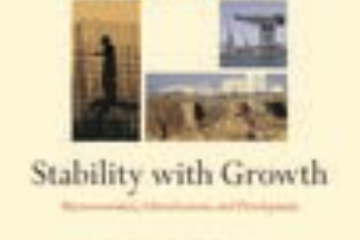Development Economics
Stability with Growth: Macroeconomics, Liberalization and Development
There is growing dissatisfaction with the economic policies advocated by many international financial institutions. One-size-fits-all policy prescriptions are likely to fail given the vast differences between countries. This book presents an alternative to “Washington Consensus” neo-liberal economic policies by showing that both macro-economic and liberalization policy must be sensitive to Read more…
Trade
The High Health Costs of TPP’s “Free Trade”
This brief is part 5 in a series on the Trans-Pacific Partnership.
Trade
TPP’s Hidden Climate Costs
Policy Brief #19 In a series of briefs, Roosevelt Institute Senior Fellow and Chief Economist Joseph Stiglitz analyzes the ins and outs of the proposed Trans-Pacific Partnership, explaining why it would structure the rules in ways that would harm the economy and American workers. This brief is part 3 in a Read more…
Trade
Who Gets to Write and Interpret the Rules Under TPP?
This brief is part 2 in a series on the Trans-Pacific Partnership.
Tax Policy
Beware of TPP’s Investor–State Dispute Settlement Provision
This brief is part 1 in a series on the Trans-Pacific Partnership.
IMF
Understanding the Consequences of IMF Surcharges: The Need for Reform
Policy Brief #23 The International Monetary Fund (IMF) provides a global public good when it lends emergency balance of payments support to countries that otherwise could not access such financing at comparable terms. No country borrows from the IMF lightly, and only does so as a last resort in the Read more…
Macroeconomics
Real Exchange Rate Policy for Economic Development
This paper analyzes the role of real exchange rate (RER) policies for promoting economic development. Markets provide a suboptimal amount of investment in sectors characterized by learning spillovers. We argue that a stable and competitive RER policy may correct externalities and other market failures, enabling the development of sectors with Read more…
Macroeconomic Policy
IPD’s Macroeconomics Task Force aims to provide a comprehensive framework for addressing key policy issues facing developing countries. These include discussions of the appropriate objectives, instruments including tax policies, policy frameworks, and institutions. In particular, the Task Force seeks to differentiate economic tools from objectives. Much macroeconomic policy and analysis has confused intermediate with final variables. The objectives of macroeconomic policy include growth, employment, and improved living standards. Targets such as economic stability and low inflation should not be viewed as objectives in-themselves, but a means to the ultimate objective of long-term sustainable growth.
Keynes-Schumpeter
Both in countries at the economic frontiers and in countries striving to catch up with the economic leaders, the process of economic development involves continuing structural transformation. Empirical research leaves no doubt about that. A fundamental feature of the development process is the emergence and growth of new industries and the decline and often disappearance of old ones. Within industries, new firms replace older ones as the dominant players, and then later themselves may decline. The transformations generally involve both the private and the public sectors.
